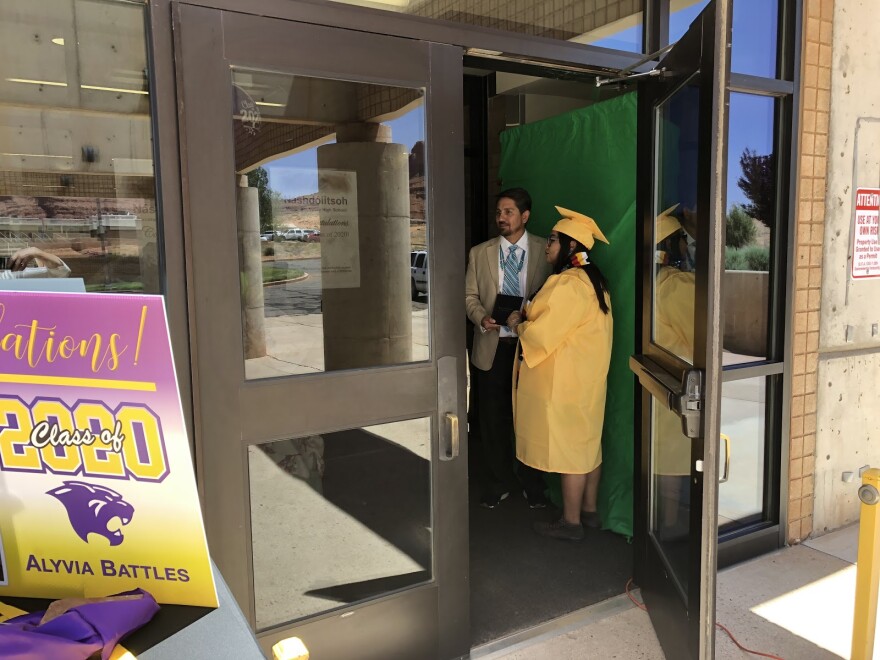MONUMENT VALLEY — It’s a bright and blustery day at Monument Valley High School, and the graduation decorations in the courtyard keep blowing away.
Principal Spencer Singer stands outside in front of the school, which is located in the heart of Monument Valley. Red sandstone buttes rise up in the background, as seniors arrive one by one to get their diplomas.
Singer is greeting the graduates and their families and then taking photos with them in front of a green screen erected in the foyer of the school.
“We’re not allowed to have the students come in the building,” he said. “So we’re doing the best that we can.”
Christel Tsosie is one of 30 students graduating from Monument Valley High School this year.
She arrived dressed in the outfit she planned to wear on graduation day. It’s a Navajo ribbon skirt her mother sewed out of sunflower fabric, along with moccasins and lots of turquoise.
And she said this is not how she expected to finish high school, after seeing her three older siblings graduate.
“I was really upset about it,” she said. “But you can’t really do anything about it, we just got to push through and keep our heads up. And we’ve still got college, so there’s nothing wrong with that.”
Tsosie is not the only one disappointed with the change, Singer said.
Schools across the Navajo Nation have had to cancel their graduation ceremonies to help stop the spread of COVID-19. The reservation currently has a higher infection rate than any U.S. state, and the tribal government has issued strict guidelines that prohibit gatherings and encourage residents to shelter in place.
Still, graduation is a big deal here, Singer said, since students in Monument Valley have to overcome so many challenges to finish high school.
Almost half the students at Monument Valley High are considered homeless under federal law, because their houses lack electricity or running water or they live with relatives while their parents earn money off the reservation. And most don’t have internet at home either, which means they have to stay after school every day to finish their homework.
“So, when the kids are able to make it to graduation, I feel like it’s kind of a celebration of life, of still being successful and thriving to some extent,” he said.

Normally, around 800 people pack into the high school gym to celebrate around 30 graduating seniors, Singer said. This year, the school initially planned to hold a parade to celebrate graduates, but they had to cancel that to comply with Navajo Nation regulations and settle for a video of the graduates receiving their diplomas instead.
Tsosie’s mother said she understands why the school decided not to hold a ceremony or a parade — and she knows her daughter will be okay.
“She’s our sunflower,” she said. “She keeps blooming. She keeps making us happy. She’s going to follow her dreams.”
Tsosie, who wants to be a nurse, technically graduated Friday when the school released the video of the graduates on Facebook, and her family is planning to celebrate with a small party.

In nearby Montezuma Creek, Whitehorse High School cancelled its ceremony over a month ago.
“I feel like people are disappointed and disheartened,” Principal Kim Shaefer said. “But they understand that this is not something Mrs. Shaefer is doing to them.”
Shaefer did not allow seniors to pick up their diplomas in person, either. That turned out to be a good decision, she said, as some of the students recently tested positive for COVID-19.
Instead, she asked everyone to send in videos and photos of themselves in their caps and gowns holding their diploma covers, which she sent out on school buses earlier this month.
But even that was a challenge, since many don’t have internet or cell service at home.
“They’d [take the photos or videos] on their cell phone,” she said. “And then go up the mesa or over to their auntie’s house in order to send it to me.”
Shaefer compiled the content into a graduation video for Whitehorse High School, and KSL is planning to air it at 9 a.m. Saturday.
She said that being included in KSL’s graduation broadcast is a silver lining in an otherwise disappointing situation.
“Now this little tiny school is up there with the big city schools,” she said. “It’s a big deal to our community.”
As for the diplomas, Shaefer said she’s thinking about delivering them herself when things settle down.
Kate Groetzinger is a Report for America corps member who reports from KUER's Southeast Bureau in San Juan County. Follow Kate on Twitter @kgroetzi


